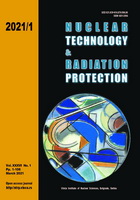
ASSESSMENT OF COMPUTED TOMOGRAPHY SIMULATORS USED IN RADIOTHERAPY TREATMENT PLANNING IN SERBIA, CROATIA, AND BOSNIA AND HERZEGOVINA
Pages: 97-106
Authors: Borislava S. Petrović, Dario Z. Faj, Mladen B. Marković, Arpad A. Tot, Milana S. Marjanović, Mladen D. Kasabašić, Ivan V. Gencel, Dragomir R. Paunović, Jelena V. Stanković, Jelena Krestić-Vesović, Ivana M. Mišković, Koča B. Čičarević, Juraj I. Bibić, Mirjana S. Budanec, Ivana T. Kralik, Stipe J. Galić, Darijo S. Hrepić, Lejla A. Ibrišimović, Jasna Dj. Davidović,
and Goran D. KolarevićAbstract
The purpose of this work was to evaluate computed tomography simulators used in radiotherapy treatment planning in Serbia, Croatia, and Bosnia and Herzegovina. A survey of quality assurance programmes of 24 computed tomography simulators in 16 facilities was conducted. A dedicated CT-to-ED phantom was scanned at 120 kV and 140 kV, to obtain CT-to-ED conversion curves as well as CTDIvol. Thoracal phantoms were scanned in the standard and extended field of view to evaluate the dosimetric effect on treatment planning and delivery. The mean age of the measured scanners was 5.5 years. The mean water HU value was –6.5 (all scanners, all voltages) and air HU value was –997. Extended field of view computed tomography data differ from the standard field of view and differences between conversion curves have significant dosimetric impact. The CTDI data showed a large range of values between centers. Better quality assurance of computed tomography simulators in all countries is recommended. The CT-to-ED curve could be used as default at one voltage and per manufacturer. Extended field of view imaging can be used, but treatment planning should be avoided in the regions out of the standard field of view.
Key words: computed tomography simulator, radiotherapy, conversion curve CT-to-ED, radiotherapy treatment planning, quality assurance
FULL PAPER IN PDF FORMAT (953 KB)
